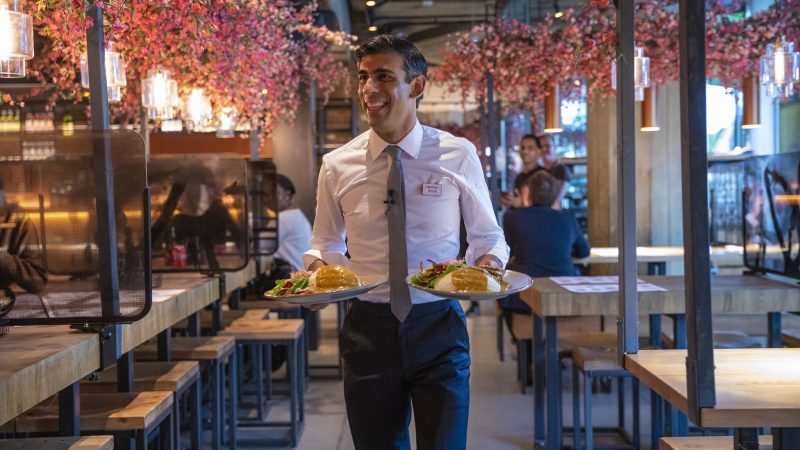
“We can all eat out to help out,” said Rishi Sunak, announcing his initiative to subsidise restaurant-goers to the tune of maximum £10 per head through the first half of each week in August. Coming just hours after he posed for a photo with a £180 coffee mug on his desk, this policy shows an insensitivity to the realities of people’s lives reminiscent of Marie Antoinette. Bankrolling people to eat out while refusing to modify the welfare reforms that are driving millions, including working people, to food banks is obscene. And let us not forget that this government had to be forced to backtrack on feeding children from low-income families over the summer holidays – a spending commitment of a mere £120m in contrast to the £500m pledged to pick up the tab on restaurant meals.
It’s only right that initiatives are put in place to help hard-hit industries cope with the fallout of coronavirus. But a soundbite-friendly, short-term gimmick that privileges those who can afford to eat out is not going to solve the problems faced by the restaurant trade. Nor will it do much for the many hospitality employees trying to get by on insecure contracts and low-paid seasonal work. And bribing people to eat in restaurants is no substitute for the confidence that it is safe to do so – something that, after months of pandemic mismanagement, ministers have failed to provide.
Sunak is proving proficient at eye-catching initiatives and enjoys a reputation as a radical Chancellor. But his focus is on businesses, not people, with the IPPR calculating that up to 45% of the net cost of the job retention scheme will end up in the pockets of landlords, banks and other lenders. Sunak’s approach, the IPPR suggests, will result in “insulating creditors and asset-owners from the worst effects of the pandemic while driving many of the most financially vulnerable deeper into debt”. Instead of “putting his arms around” workers during the crisis, the Chancellor has enforced a clear divide between those he considers economically useful and those he has abandoned to fend for themselves – something the three million-plus applicants for Universal Credit since March are discovering to their cost.
Far from being “unencumbered by dogma“, Sunak subscribes to that most enduring of Tory narratives: the deserving and undeserving poor. While some workers are furloughed on 80% of their pay, those with no recourse to public funds are left destitute. While homeowners enjoy a stamp duty break, those who rent get nothing. And while restaurant customers are treated to a cut-price meal, low-income families are increasingly forced to fall back on food banks. Independent food banks report a 177% increase in need during May this year compared to May 2019 – with the biggest reason given being that benefits are insufficient to be able to afford food. As Sabine Goodwin of the Independent Food Aid Network said: “While millions of people cannot afford to buy food at all, the Chancellor’s voucher scheme for restaurant diners is particularly ill-considered.”
Coronavirus has offered us a chance to put a different narrative in place, one that reduces inequalities rather than exacerbating them. A genuinely radical Chancellor would give us a functioning welfare state, affordable housing, a real Living Wage, provision for decent local services – rather than a bung to get us into restaurants. A genuinely radical Chancellor would invest in income-enhancement measures, such as the increase in child benefit that the Labour Hunger Campaign is lobbying for, and make the VAT cut universal – as Alastair Darling did in 2008 – in order to stimulate the economy by increasing everyone’s spending power.
The sheer crassness of announcing subsidised restaurant meals while almost simultaneously reinstating benefits sanctions is a graphic illustration of the UK’s culture of haves and have-nots; the fact that Sunak doesn’t appear even to have considered that there are many people who can barely afford to eat is a symbol of the casual cruelty of this government. Rather than channelling Marie Antoinette, the Chancellor would do well to skip a couple of centuries further back to a very different French ruler. Henri IV was determined to bring prosperity to everyone after the country had been torn in two by religious wars, vowing that even the poorest labourer would be able to afford a poule au pot – or chicken in the pot – every Sunday. He understood what our Chancellor does not: if you want to get the economy moving, you have to ensure it works for everyone, not just the privileged few.




More from LabourList
‘Labour won’t stop the far right by changing leaders — only by proving what the left can deliver’
‘Cutting Welsh university funding would be economic vandalism, not reform’
Sadiq Khan signals he will stand for a fourth term as London Mayor